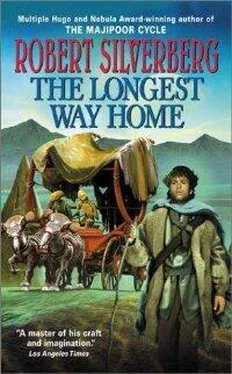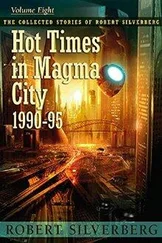He thought several times of stopping to sleep, but no, he wanted to be out of the high country, entirely out, before he permitted himself to halt. Sanivark went sailing past him overhead, moving into the western sky and showing him his goal, a shrouded realm of drifting whiteness. The mists thinned as he went down toward it, and just as the pale strands of first light began coming over his shoulder he saw a green meadow not far below him, and a stream or perhaps a small river, itself nearly invisible but outlined by a long bank of fog that clung to it like cotton batting.
This was as far as he could go without resting. At the place where the last stretch of highland forest shaded into the meadow bordering the riverbank he found a deserted campsite that probably had been used by hunters in the autumn, and settled into it. There was a little cave that someone had roughly excavated out of the side of the hill, a stone fireplace with cold charcoal still in it and the charred bones of some fair-sized animal scattered about nearby, and a stack of firewood perhaps awaiting use by the returning hunters in the spring. Joseph dined on dried meat and berries and crawled into the cave just as the last few stars were disappearing from the rapidly bluing sky. He unwrapped his fur mantle and curled it around himself, tucked his hands into his robes, and closed his eyes. Sleep rolled over him like a tumbling boulder.
He awoke at midday. A great silence enfolded him, broken only by the screeching caws of the dark birds that were whirling in enormous circles above him in the cloudless sky. The mists had lifted and the sun was bright overhead. He dutifully said his morning prayers and breakfasted sparingly and sat for a long while looking back at the mountains out of which he had come, thinking about his zigzag route through the highlands these past weeks or months and wondering whether in all that time he had succeeded in getting significantly closer to the Southland. He doubted it. Certainly he was somewhat farther south than on the day when he had stood staring at the dismal blackened remains of Ludbrek House, but a map, he suspected, would show him that he had traveled no more than a finger’s breadth of the total distance separating him from his father’s distant lands.
By this time there would be no reason for anyone at home to think that he was still alive. The Keillorans were basically optimistic people, but they were not fools, and such a degree of optimism would be nothing if not foolhardy. He was here, and they were there, and there was so much territory between that he knew he might just as well start thinking of himself as irretrievably lost, which was not quite the same thing as being dead, but not all that far from it.
I am the only one in the world who knows where I am, he thought. And all I know is that I am here , though I have no way of knowing where here is.
Joseph looked up at the blank blue screen that was the sky.
“Father!” he cried, setting up echoes as his voice reverberated off the mountains from which he had just descended. “Father, it’s me, Joseph! Can you hear me? I’m in Manza, Father! I’m on my way home!”
That was at least as useful as talking into a broken combinant, he told himself. And it was good to hear the sound of a human voice again, even if it was his own.
He went down to the stream, stripped, bathed. The water was so cold it felt like fire against his skin, but he had not been able to bathe very often in the mountain villages, and he forced himself through an elaborate ablution. He washed his clothes also, and set them out to dry in the sunlight, sitting naked beside them, shivering but strangely happy in the silence, the isolation, the brightness of the day, the fresh clear air.
And then it was time to get going. There was nothing like a road here for him to follow, not even a footpath, but the land was flat, and after his nighttime scramble through the mountain foothills this seemed almost preposterously easy. Just put one foot forward and then another, on and on, keep the mountains to your left and the stream to the right and the sun shining on your nose, and you will find that you are heading toward home, getting closer with every step you take.
No one seemed to live in this district. He wondered why. The soil seemed fertile enough, there was plenty of fresh water, the climate was probably all right. Yet he saw no sign that the Folk had farmed here, and none of the claimstones that would mark land belonging to one of the Great Houses, and no trace of a settlement of Indigenes, even. But of course this was a large continent and much of it, even after all these centuries of the human presence on Homeworld, was still as it had been when the first Folkish explorers had landed here.
A strange concept, Folkish explorers . Joseph had never examined the glaring contradictions in the term before. The Folk were such stolid, unadventurous, spiritless, passive people, or at least that was how he had always regarded them. Everyone did. One did not think of people like that as explorers. It was hard to imagine that any of them could have had enough fervor of the soul to get themselves out into spaceships and travel across the empty light-years and discover Homeworld, and yet they had. Hadn’t achieved much once they got here, no, but they had managed to go looking for it, and find it, and settle it.
And yet, stolid and unadventurous and spiritless and passive though they might be, they had also found enough fervor within themselves just now to rise up here in the northern continent or perhaps throughout the entire world and kill most or all of the Masters, and set fire to their houses, and wreck their estates. That was something worth thinking about. Perhaps we have never understood much about the Folk at all, Joseph told himself. Perhaps they are almost as alien to us as the Indigenes or the noctambulos, or the alien races that live on the other worlds of the galaxy.
He went along steadily, marching from sunrise to sundown, stopping to eat whenever he felt hungry, finding some cave or burrow or other sort of shelter for himself at night. The weather grew better every day. Sometimes there were brief rainstorms, mild and pleasant, nothing like the hard chill downpours of the high country. He often took off his clothes and stood naked in the rain, enjoying the sensation of cool clean water striking his skin.
This was beautiful country, still completely devoid of any sort of settlement. There was a springtime feel to the air. Green new growth was appearing everywhere. Dazzling carpets of tiny flowers, some pink, some yellow, sprang up after each rain-shower. They seemed to come straight out of the ground, without any leaves. Joseph made no attempt to keep track of the passing of the days. He still clung to the fantasy that if only he kept walking at this steady pace, ten miles a day, fifteen, however much he might be able to cover, he would come to the bottom of this continent sooner or later and cross over into Helikis, where, he wanted to believe, there had been no Folkish uprising and he would find people to help him get the rest of the way home.
He knew there was some element of folly in the belief that he had been clinging to all this while—without a shred of evidence to support it—that everything was still normal in Helikis. If there had been no rebellion in the southern continent, why had the southern Masters not sent aid to their beleaguered cousins in the north? Why were no military planes roaring northward overhead? Why no armies marching swiftly to set thing to rights? But he wanted to think that all was well in the Southland, because this whole long march of his would be pointless, otherwise. Joseph told himself that he had no knowledge about what was going on in most of the world, anyway. In all these months of wandering he had covered only a tiny area of the planet. There might be a tremendous civil war under way on a hundred different battlefields even now, while he, cut off from everything and everyone, plodded southward day by day in solitude through this quiet uninhabited region.
Читать дальше












